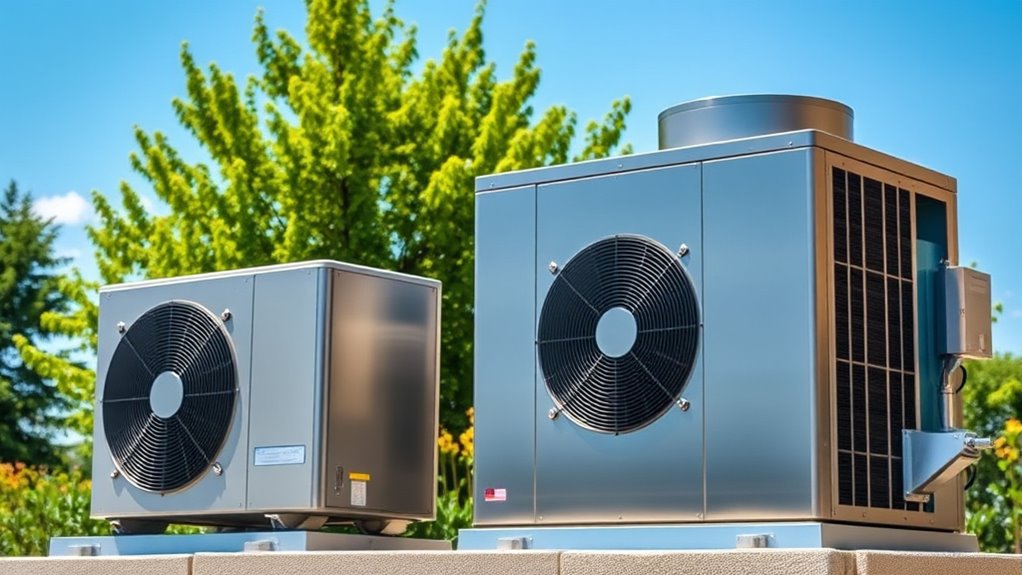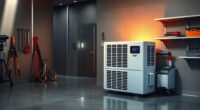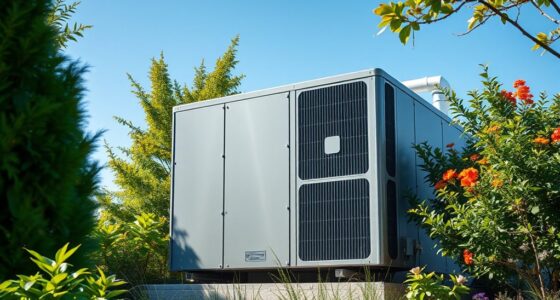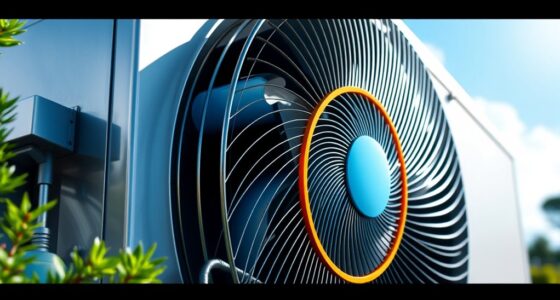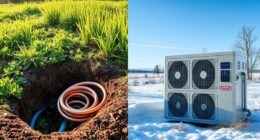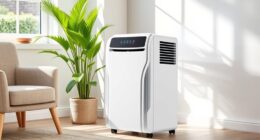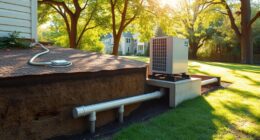Choosing the right size for your heat pump directly impacts its efficiency and your comfort. An appropriately sized unit runs smoothly, matches your home’s heating and cooling needs, and minimizes energy waste. Oversized models cycle on and off frequently, wasting energy and causing wear. Undersized units work harder, leading to higher bills and less comfort. To optimize performance, understanding proper sizing techniques is key—keep exploring further to learn how to select the best fit for your home.
Key Takeaways
- Properly sized heat pumps operate more efficiently by matching the home’s heating and cooling demands accurately.
- Oversized units frequently short cycle, increasing energy consumption and reducing overall efficiency.
- Undersized systems struggle to maintain consistent temperatures, leading to longer run times and higher energy use.
- Correct sizing minimizes wear and tear, extending the system’s lifespan and maintaining optimal efficiency over time.
- Accurate load calculations help select the right size, maximizing efficiency and comfort while reducing utility costs.
How Proper Sizing Enhances Heat Pump Performance
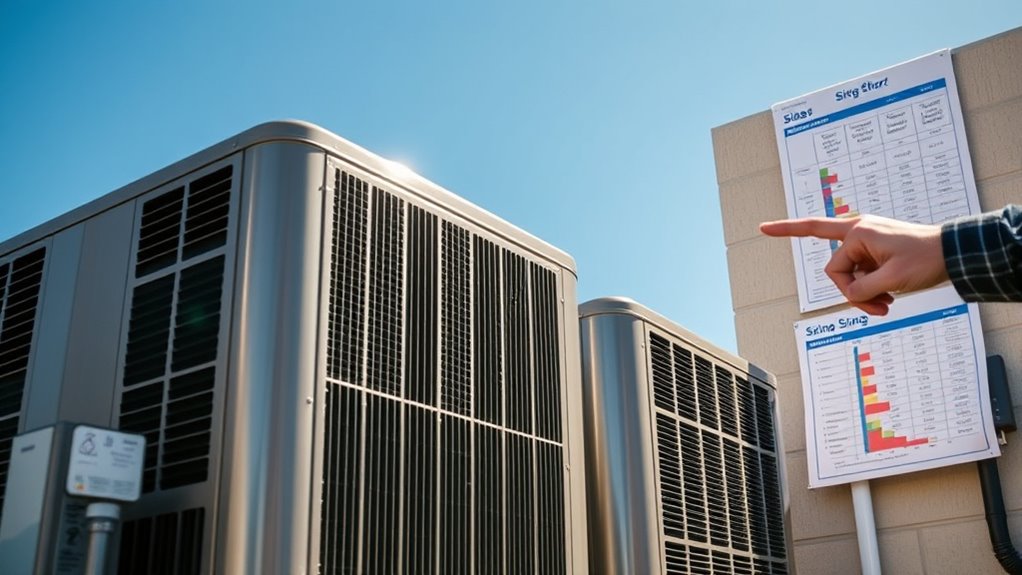
Properly sizing your heat pump is vital for peak performance because it ensures the system matches your home’s heating and cooling needs. When the size is right, your heat pump operates more efficiently, reducing unnecessary cycling and energy waste. Proper sizing helps prevent short cycling, which can cause wear and tear, keeping the system running smoothly longer. An accurately sized heat pump maintains consistent indoor temperatures, eliminating hot or cold spots and boosting comfort. It also improves dehumidification, especially in humid climates, preventing issues like mold growth. To achieve proper sizing, professional load calculations—such as Manual J—are essential. This careful process maximizes efficiency and minimizes long-term operational costs, ensuring your heat pump delivers reliable, energy-efficient performance year-round. Additionally, understanding the heat pump size and efficiency relationship can help you select a unit that provides optimal performance for your specific climate and household needs.
Furthermore, considering the local climate conditions during sizing can significantly enhance your system’s effectiveness and longevity.
The Impact of Oversizing on Energy Consumption
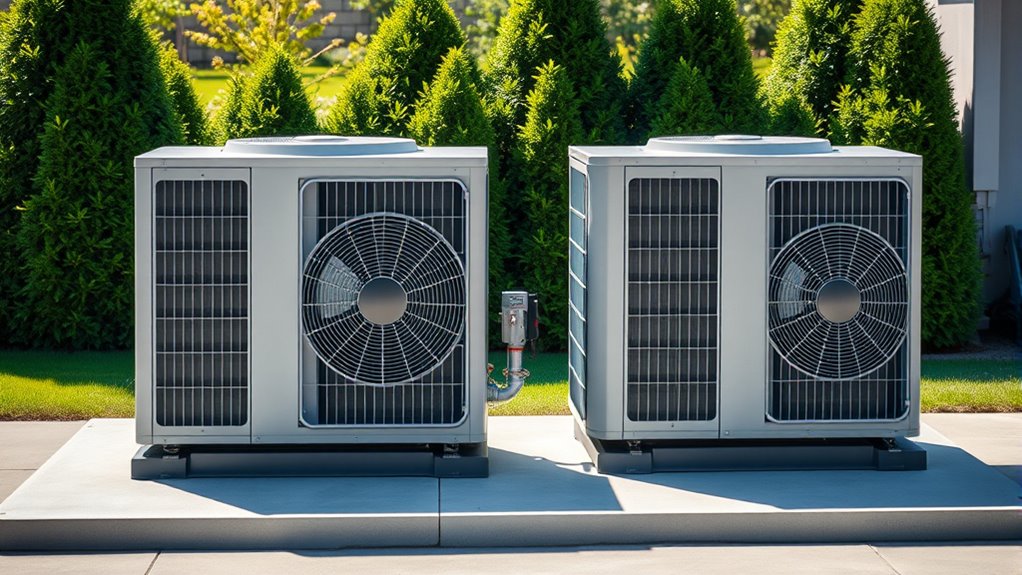
When a heat pump is oversized for your home, it doesn’t operate as efficiently as a properly sized unit. Oversized heat pumps tend to short cycle, running briefly and consuming more energy than necessary. Short cycling can cause increased wear on system components and higher energy bills. This inefficiency can increase your energy costs considerably, sometimes by 20-25%. During short cycles, the system struggles to maintain stable temperatures, leading to rapid temperature swings and inadequate dehumidification. These issues cause the system to work harder, raising utility bills over time. Additionally, the repeated on-off cycling can lead to premature wear and tear on components, reducing the system lifespan. Proper sizing based on home insulation and layout is crucial for optimal performance and energy savings. Utilizing sound design principles in system installation can also help reduce noise and improve efficiency. Employing proper maintenance practices ensures the system continues to operate efficiently and extends its service life.
Benefits of Correctly Sized Heat Pumps for Comfort and Longevity
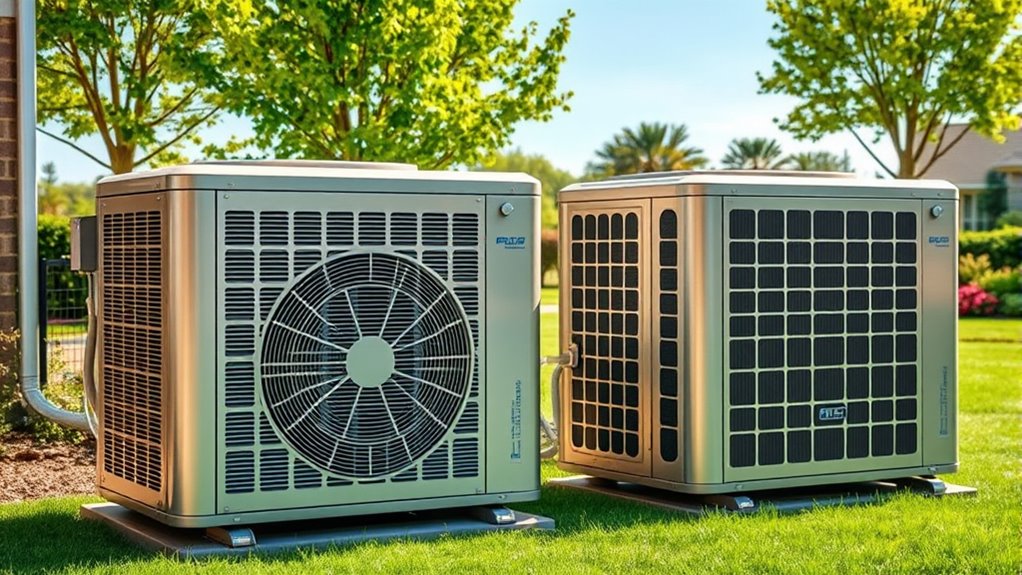
Choosing the right size for your heat pump guarantees it runs efficiently, saving you money on energy bills and reducing wear and tear on the system. Proper sizing ensures ideal energy efficiency, meaning your system uses less power while providing reliable comfort. When your heat pump is correctly sized, it won’t cycle on and off excessively, which minimizes system stress and extends its longevity. It also maintains consistent indoor temperatures, preventing hot or cold spots that cause discomfort. Proper sizing allows your system to better handle extreme weather conditions, reducing strain and potential damage. Additionally, it supports improved humidity control and indoor air quality, creating a healthier, more comfortable living space. Correct sizing also helps prevent unnecessary equipment failure, which can lead to costly repairs and replacements. Proper sizing is essential for maintaining system performance over time and avoiding costly repairs. Overall, correct sizing is key to maximizing your heat pump’s performance and lifespan.
Common Mistakes in Heat Pump Sizing and Their Consequences
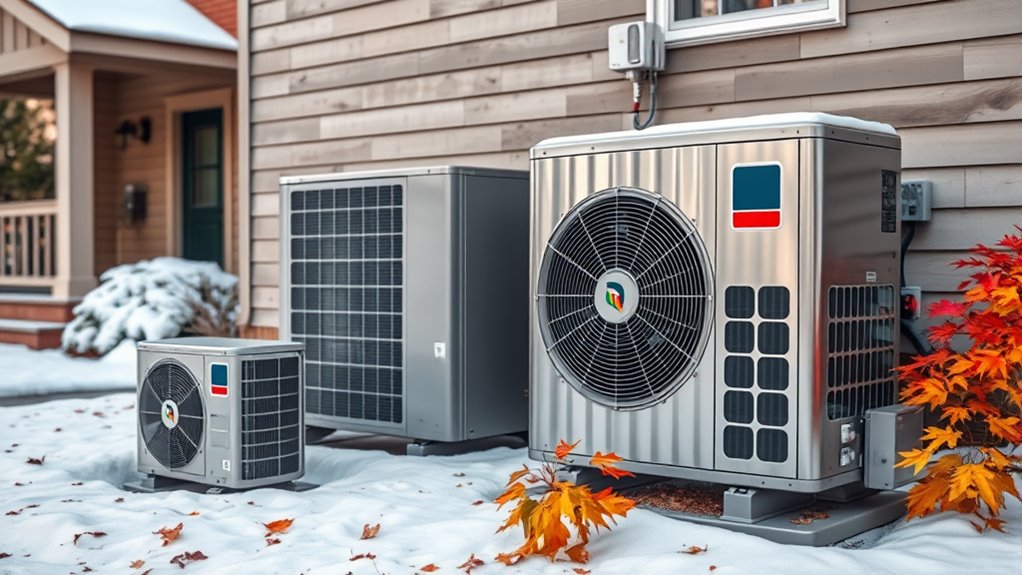
One common mistake homeowners make is relying on simple rules of thumb or online calculators to size their heat pumps. This often leads to an oversized system, which causes short cycling and inefficient operation. An oversized heat pump heats or cools too quickly, then shuts off, increasing wear and maintenance costs. Incorrect sizing can also cause uneven temperatures and poor humidity control, reducing comfort and system lifespan. To illustrate, consider this:
| Mistake | Consequence |
|---|---|
| Oversized system | Short cycling, higher energy costs |
| Relying on simple rules | Incorrect sizing, inefficiency |
| Ignoring load calculations | Reduced comfort, increased wear |
| Not considering climate | Poor performance in cold weather |
| Overlooking insulation | Larger systems needed, waste |
Additionally, AI security considerations emphasize the importance of precise system design to prevent vulnerabilities and ensure optimal performance. Proper load calculation is essential to avoid these issues and optimize efficiency. Accurate load assessments help prevent over-sizing and improve overall system performance. Understanding heat pump sizing is crucial to achieving maximum efficiency and durability. Avoid these mistakes for better efficiency and longevity.
Techniques and Tools for Accurate Heat Pump Sizing
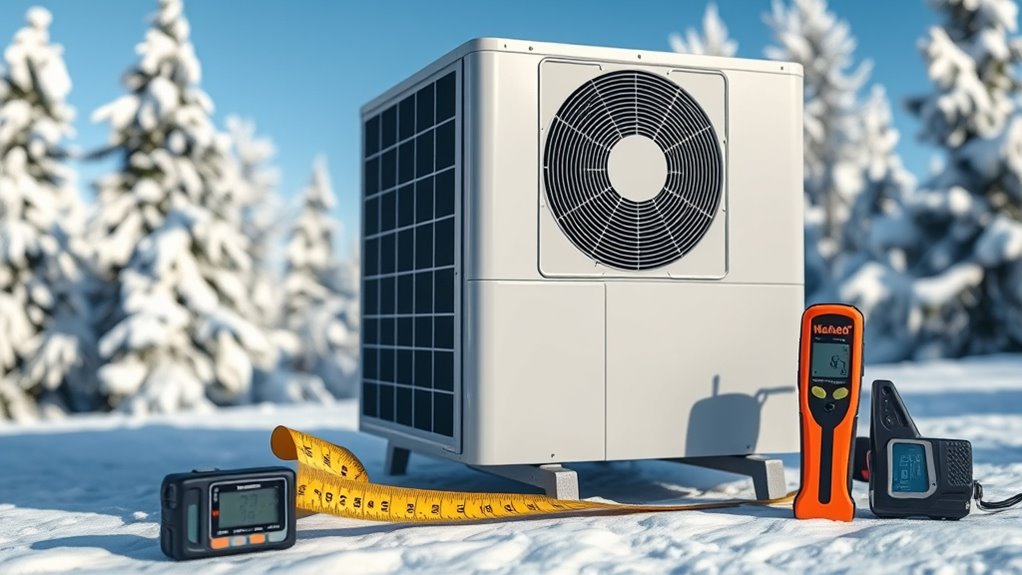
Accurate heat pump sizing begins with professional load calculations, such as Manual J, which evaluate factors like climate, home size, insulation, and window efficiency. These calculations guarantee you select a unit that matches your home’s heating and cooling needs. To refine the assessment, blower door tests measure air leakage, providing crucial data on home airtightness, which impacts capacity requirements. While tools like Cool Calc and online calculators can help, they should complement, not replace, professional evaluations. Using the capacity range specified by Manual S ensures the equipment aligns with your home’s load calculations. Additionally, understanding the Technology – Whatever Want options available in heat pump systems can aid in choosing models with enhanced features for better efficiency and adaptability. Incorporating proper sizing techniques ensures optimal system performance and longevity. Regularly reviewing manufacturer specifications, including capacity at various outdoor temperatures, helps optimize system efficiency and performance, preventing issues caused by undersized or oversized units. Furthermore, considering factors like seasonal variations in temperature can improve the accuracy of your sizing process, leading to better energy efficiency throughout the year. A thorough assessment of system capacity requirements can prevent excessive energy consumption and reduce operational costs, ensuring your investment provides maximum benefits over time. Additionally, staying informed about latest technological advancements in heat pump design can further enhance system efficiency and sustainability.
Frequently Asked Questions
Are Bigger Heat Pumps More Efficient?
You might think bigger heat pumps are more efficient, but that’s not always true. If the unit is too large for your home, it’ll short cycle, which lowers efficiency and increases wear. The key is choosing a size that matches your heating and cooling needs. When properly sized, your heat pump operates at maximum efficiency, regardless of its capacity. So, size alone doesn’t determine efficiency—you need the right fit.
What Size Heat Pump for 2000 Sq Ft?
Think of your home as a delicate garden that needs just the right amount of water. For a 2000 sq ft house, you should choose a heat pump around 3 to 4 tons, like a steady stream that nurtures without overwhelming. Using proper sizing guarantees comfort, efficiency, and avoids short cycling. Trust industry standards and consider your home’s unique features to select the perfect size, so your home stays cozy year-round.
Is It Better to Oversize or Undersize a Heat Pump?
You might wonder if oversizing or undersizing a heat pump is better. It’s actually best to size it correctly, based on your home’s needs. Oversizing causes short cycling, reducing efficiency and comfort. Undersizing forces the system to run constantly, wasting energy. Proper sizing ensures your heat pump operates near its ideal capacity, saving you money and maintaining comfort. Use Manual J calculations to find the right size for your home.
How Many Square Feet Will a 18,000 BTU Heat Pump Heat?
A 18,000 BTU heat pump can typically heat between 600 to 900 square feet, depending on factors like insulation, ceiling height, and climate. You should consider your home’s specific characteristics to determine if this size matches your needs. For the most accurate result, consulting a professional for a Manual J load calculation helps guarantee the unit is right for your space, maximizing comfort and efficiency.
Conclusion
Choosing the right heat pump size is vital for peak performance, energy savings, and longevity. Oversizing might seem tempting but can lead to wasted energy and frequent wear. When you size correctly, you get the best comfort and efficiency. Remember, it’s better to be safe than sorry—getting it right from the start saves you headaches down the road. Trust the right tools and techniques to guarantee your heat pump’s size hits the mark every time.
